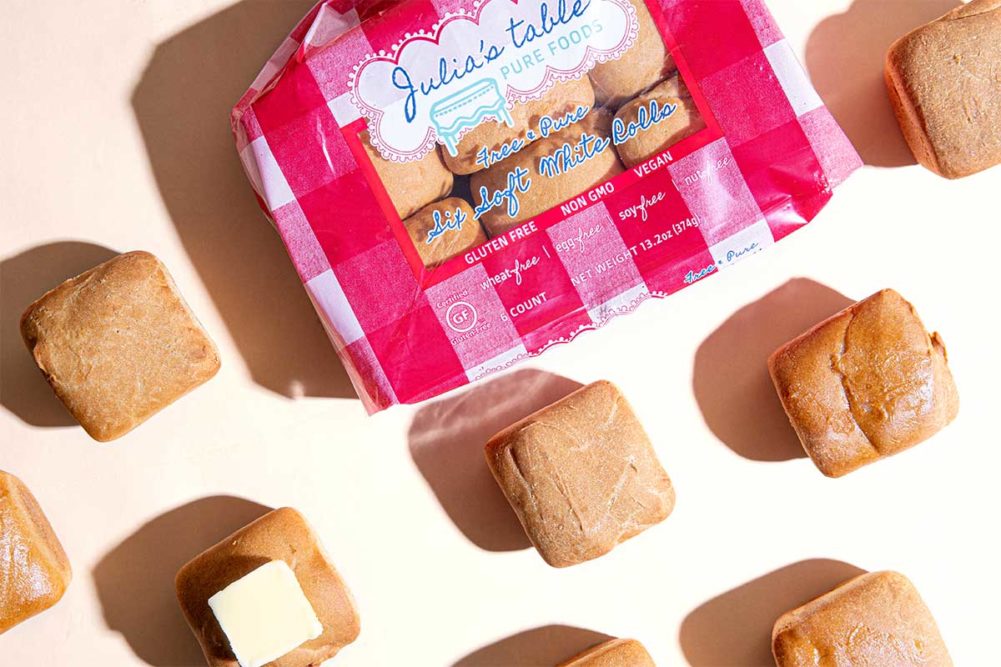Formulating gluten-free products, especially bread, tortillas and other baked items, has never been easy. In fact, during gluten-free’s infancy, some bakeries relied on starches, additives and sugars as replacements to maintain taste and product integrity, noted Tim Pollak, partner and head of strategy for Bethlehem, Pa.-based Factory LLC, whose brands include Mikey’s baked goods, including grain-free English muffins.
“Consumers who chose gluten-free for the ‘health halo’ unknowingly got products that were often worse for them than those with gluten,” Mr. Pollak said. “Today, more manufacturers are making a conscious effort to bake nutrition into their gluten-free products, not just remove the gluten. They are offering more and better-tasting gluten-free alternatives.”
Mikey’s, he added, has expanded from densely nutritious baked goods to a line of hand-held meals and superfood-enhanced tortillas, while its gluten- and dairy-free products incorporate clean, simple ingredients.
“As consumers demand more ingredient transparency, developers have become more creative, experimental and resourceful,” Mr. Pollak explained. “Mikey’s, for example, launched its brand with an English muffin made with almond flour and five other kitchen pantry ingredients. It met the exacting standards of not just gluten-free consumers, but dairy-, grain- and soy-free, keto, paleo, vegan, and Kosher.”
Marion Edwards, chief marketing officer for Salt Lake City-based Julia’s Table, pointed out that clean ingredients have come a long way over the past decade since bakers needed to secure truckloads of alternative flour in advance because there were few options to meet a certified gluten-free standard.
She noted that Julia’s Table product development team worked with an international consultant to develop a unique milling process for its proprietary alternative flour, which is imported, to create its products, which include bread, rolls, wraps and sweet baked goods.
[Related reading: Gluten-free products play in a bigger arena]
“It made it super difficult during COVID for us to bake a consistent, quality product,” Ms. Edwards said. “That has caused us to reformulate and relaunch products, but at the same time, it has strengthened our supply chain. The lack of gluten coupled with the complexities a free-from allergens approach necessitates is a technological challenge, which must not be underestimated. It requires a broad understanding and a comprehensive approach in food technology to make gluten-free products the best in quality and fulfill our tastes-like-home promise.”
While it’s not a gluten-free option, Natural Ovens’ Keto-Friendly bread by Alpha Baking Co. has 12 grams of carbohydrates and 12 grams of dietary fiber, which together slashes the net carbs per slice.
Tim Lotesto, senior director, national retail key accounts, said the Chicago-based company worked in close partnership with an ingredient supplier on the formulation to get to the carb and fiber counts it wanted “without turning the ingredient legend into a novel.”
He added that formulating required a balancing act between producing a dough that will run on commercial equipment and creating a tasty bread that meets keto-friendly standards. It shows how some mainstream wholesale bakers are playing to the keto phenomenon.
“I think keto is popular because it works,” he said. “It may not work for everyone, but those who benefit often see dramatic results.”
This article is an excerpt from the December 2020 issue of Baking & Snack. To read the entire feature on gluten-free trends, click here.






